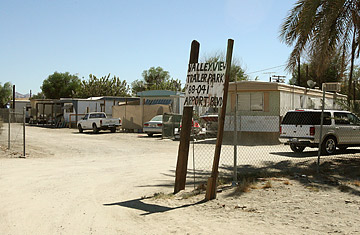
A trailer park in Thermal, Calif.
For the past 28 years in Goleta, Calif., manufacturing engineer Kenneth Tatro has lived in Rancho Mobile Home Estates, where he could afford to raise his four children in a beachside community in which home prices are typically out of reach for the middle class. He retired a few years ago to enjoy peaceful walks with his wife and his dog Kayla, but today Tatro — who is 71 years old and the president of his park's home-owners association — finds himself on the front lines of a war over California's nearly 5,000 mobile-home parks, where as many as 1 million people live under roofs they own but on top of land they rent.
"They are going after the weakest and most vulnerable prey: our demographic, with our captive housing and financial position," explains Tatro of the battle, which pits low-income and middle-class people like him against wealthier opponents, the owners of the park land. "However, we are coming back at them straight up. They have not seen the fight we are [giving them] and will continue to give them."
Supporting Tatro in his fight are the more than 100 California jurisdictions such as Goleta, Palm Springs and San Jose that have used rent-control ordinances for decades to protect the parks as bastions of affordable housing. They're up against park owners, like Rancho's Daniel Guggenheim, who claim that those ordinances have locked parks into an unfair financial stagnation while every other piece of Golden State land has enjoyed explosive upticks in value. So far the park owners' fight against rent control hasn't paid off. They suffered a major defeat just before Christmas when the Ninth Circuit Court of Appeals ruled that Goleta's rent-control ordinance was constitutional and does not amount to a diminution of Guggenheim's property rights. "The people who really do have investment-backed expectations that might be upset by changes in the rent control system are tenants who bought their mobile homes after rent control went into effect," wrote Judge Andrew J. Kleinfeld. "Ending rent control would be a windfall to the Guggenheims, and a disaster for tenants who bought their mobile homes after rent control was imposed in the '70s and '80s."
Still, with lawyers as foot soldiers, the park owners are continuing to target the legality of rent control in the courts while simultaneously pushing to convert their parks into subdivided, condominium-like properties. Home owners like Tatro, of course, will have the opportunity to buy plots of land they now rent. The catch: once the first lot is sold in a trailer park, rent control ends and market forces are likely to raise prices beyond the reach of current tenants, making condo conversion — which state law originally intended to empower home owners rather than park owners — the perfect end run. (Tatro and his fellow residents are now in court fighting Guggenheim's condo conversion proposal for Rancho Mobile Home Estates.) Furthermore, Guggenheim's attorney Robert Coldren says that the Ninth Circuit's decision is probably going to be appealed all the way to the U.S. Supreme Court. "We and the taxpayers of Goleta and those who support true affordable housing lost the battle but will win the war," said Coldren.
Meanwhile, condo conversions march forward, largely due to a 2002 case involving El Dorado Mobile Homes of Palm Springs that blocked jurisdictions from imposing too many burdens on park owners seeking such a change. The victorious attorney in that case was Richard Close, and he's kept at it ever since, helping park owners convert and lobbying against antisubdivision bills in the statehouse. "Residents who like rent control spread all sorts of panic within a park telling the elderly and low-income people that they are going to be thrown on the street and that their rents will quadruple," declares Close, who says the allegations are untrue because state law protects low-income residents from eviction. "Generally, those statements are made by people who are not low-income, who don't want to pay market rent."
But attorney Bruce Stanton, who has represented mobile-home owners across the state since the early 1990s, doesn't see it that way. "The problem is that you have an entire generation of mobile-home owners with tens of millions of dollars of equity in 4,800 parks throughout California," he says. "Many of them are in rent-controlled jurisdictions, and if you just took that all away, it's going to devalue the home significantly. In some respects, it can devalue it to virtually nothing."
Stanton also points out the elephant-sized oxymoron in the room: mobile homes stopped being mobile many years ago, and now require thousands of dollars and special equipment to relocate. "It's not like the supply-and-demand market of apartments, where if rent goes up you just move down the street," says Stanton. "You can't do that. It's a spatial monopoly — there's no freedom of movement. Without some kind of protection, park owners can do whatever they want."
